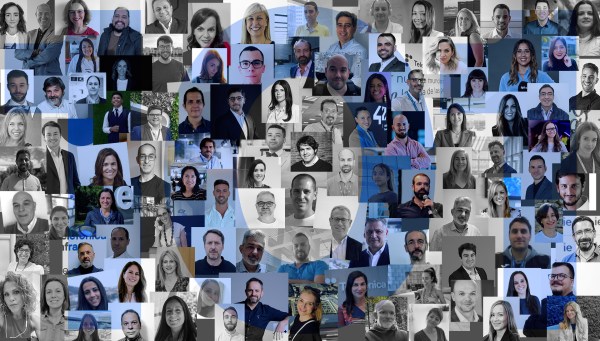Tell us a little about yourself. What does your job at Telefónica involve?
My name is Maite Marrupe, I am an engineer by training and have been part of the Telefónica team for almost 25 years. During this time, I have had the opportunity to lead projects in technical and management areas, always with a common denominator: driving transformation. From network planning to key account management, I have supported teams through cultural and operational change processes.
I currently head up the Business After-Sales department for large regional accounts and SMEs. I have two responsibilities: ensuring operational excellence on a day-to-day basis and leading the evolution of the customer service model, with a medium- and long-term vision that allows us to anticipate our customers’ needs.
Why is it important to transform and optimise processes?
In today’s dynamic environment, transforming and optimising processes is not an option, it is a necessity. At Telefónica, we strive for service excellence, and that requires us to continually question how we do things.
Simplification, efficiency and customer focus are the pillars on which we are building this evolution. Only by taking a critical and open-minded approach to change can we incorporate disruptive technologies and generate real value.
Why is digital transformation so important for companies in general?
The digital transformation of companies is essential for their very survival.
To begin with, it has a direct impact on their competitiveness. Nowadays, there is no need to explain that the markets we are part of are globalised, highly dynamic markets, where falling behind in this regard can mean losing ground to other competitors who are more agile and efficient.
There is also a direct relationship between the degree of digitisation and operational efficiency. We have been digitising and automating processes for many years, incorporating RPA technologies and, for some time now, exploiting the capabilities of artificial intelligence. All this transformation allows for cost reduction, minimisation of errors and acceleration of service delivery.
Furthermore, it is the basis for meeting customer expectations, offering the agility they demand today, personalising their experience and channelling the relationship with them through digital channels, regardless of the sector in which the activity is carried out.
Finally, digital transformation also allows companies to incorporate innovation more fluidly, which is the basis for being able to adapt quickly in the future to different crises that arise or changes in the market.
And for SMEs in particular?
Spain has a business fabric with a huge weighting in the small and medium-sized enterprise segment, and while everything mentioned above applies equally to SMEs, the big difference is that large companies and the Spanish public administration have already tackled the digitalisation of their processes and their relationship with customers or citizens, while for SMEs, digitalisation remains largely unaddressed.
In the case of SMEs, the challenge is even greater. Many do not have the resources or internal knowledge to tackle this transformation. That is why at Telefónica we work to support them, not only with technology, but also with advice and tailored solutions. Digitalisation is not a one-off project, it is a structural change that must be sustainable over time.
What does the work of the after-sales departments consist of? What are their main functions?
The business after-sales team is globally responsible for providing customer services, and we must ensure the highest standards of quality while managing projects operationally and financially throughout the entire service life cycle.
We are responsible for technical customer service, which can be standardised or highly customised for larger projects. We also have technical operation teams for diagnosing and resolving incidents and teams focused on transforming and improving service, provision and breakdown processes.
Our mantra is to prevent service incidents, be proactive and agile in detecting and resolving them, and accompany the customer throughout the process, providing them with the relevant information they need to keep their business running.
We work with companies in critical sectors — industry, banking, retail, public administration — for whom communications and IT are at the heart of their business. Our mission is to enable them to focus on their business with the peace of mind that we are taking care of their connectivity and technology. We are the bridge between operations and the customer, and we aspire to be a factor in customer loyalty.
How does the development of new technologies impact these departments?
New technologies are a transformative lever. They allow us to evolve towards smarter service models, with virtual agents, AI, automation and omnichannel capabilities. They also improve service monitoring and proactivity in incident resolution.
From my point of view, the real challenge is to think big. It’s not just about improving what already exists, but about redesigning from scratch, starting with a disruptive mindset, the services we offer and the processes that support them. At the end of the day, technology is the means, but ambition and vision are what make the difference.
Which people working at Telefónica would you nominate for this interview because you consider them to be excellent at their job?
I would nominate Isaac Monjas Lesaga, from the wholesale sales team, for his in-depth knowledge of the wholesale business and his cross-functional collaboration with other areas. And Elena Sumastre Treviño, a professional who has been a role model for me because of her inspiring leadership style and her management of her team, with a friendly approach and a focus on developing their skills.







